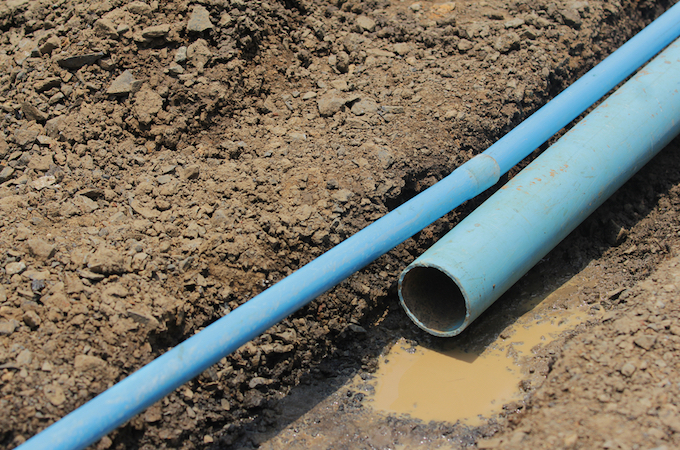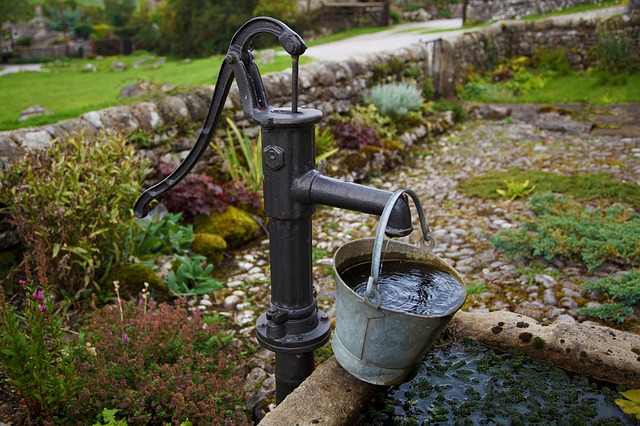One positive aspect to living in an internationally renowned ‘wet’ island country is that water is never usually that far away. However, a potable (drinking) water supply can be more difficult to track down. John Kealy looks at your options.
For those of us who have never had to be concerned about where our water comes from beyond ‘the tap’, to be forced to look deeper into it – as every self-builder does – can be quite an eye-opener. To make life that bit harder for the self-builder, a water supply of some description will be necessary before construction gets into full swing. Not just for filling kettles, mind you, but also for more fundamental operations like mixing concrete. You could get by temporarily by using water from containers, but the novelty and economics of that will quickly wear off.
While organising a water supply might seem a little daunting to some, there are usually very few decisions to be made by the self builder and most of those can be addressed with:
– Unless you have some very convincing reasons, only drill a well if a mains supply or Group Water Scheme is not available in your area.
– Get a water analysis done to know what the water quality is from day one. After air, water is your second biggest intake before food. Your health and vitality depend on it – and so does the longevity of all your new household appliances and fittings. Lime, acid water, iron, manganese, sulphur and unwanted bacteria are what you’re basically looking to avoid. While chlorine will affect how the water tastes, it is not as vital a consideration. Based on the water analysis you will know what kind of treatment action is required.
– While you’re at the construction stage, make sure you select water-efficient appliances for the kitchen and bathroom.
– Take steps to reduce your water consumption by using recycled water where feasible as it is an environmentally responsible thing to do and, if you happen to be on a mains supply, it will save you money.
PUBLIC MAINS SUPPLY
If it is possible, perhaps the least troublesome option for a self-builder is to connect into the public mains water supply. The quality of the public water supply in Ireland is generally excellent and, while there may be some pockets where the supply is irregular, this is by far the exception.
The most trouble you can expect from this option will be of a scheduling, administrative or financial nature as you try to organise for a connection. And it will have the least impact on your build with regard to upheaval with no special equipment or extensive digging beyond a trench for the pipe required. You will have to pay for the pleasure of a connection and you will eventually (if not already) be faced with usage charges. Considering most of the alternatives, paying for a mains supply is a good deal.

An application for a water supply connection is usually made through your local authority. It is a good idea to approach them in the very early stages of your project (the next stop after the estate agent) to see what their requirements, and their reaction times, are like.
GROUP WATER SCHEMES
In ROI, if a connection to a public water supply is not an option, investigate the existence of a Group Water Scheme in your area. These generally exist where the local authority has no immediate or long term intention to provide a water supply. As the name implies, these schemes come about when groups of individuals club together to provide their own water supply. The water may come from a source such as a well, lake or the public water supply itself.
However, the infrastructure and management of the scheme is under the control of its members. The system is still subject to water standards and regulations so quality should not be a concern. While the local authority provides subsidies to these schemes based on the number of homes supplied, this is unlikely to be enough to cover running and capital costs so you will end up having to put your hand in your pocket!
While it might sound an odd way of securing a water supply on initial hearing, these schemes are generally very well organised, controlled and regulated, and are an excellent example of local people helping themselves. From a financial, convenience and security of supply perspective, consider this option strongly if it is available.
PRIVATE WELL SUPPLY
If mains water supplies are not available or you would prefer some independence, you could arrange to have a well drilled. Where exactly you drill on your site will be dictated by where the underground water source is. Generally, in Ireland, if you drill deep enough, you will hit water eventually.
The trick is to find the best location at the least expense. You could get a water diviner to do this but, as this may not be ‘psychologically acceptable’ to some people, you can usually pass over the decision on the best place to drill to a specialised company.
You will need to make sure that the drilling company is a reputable one and that you get the financial/contract arrangements clearly laid out before work starts. You do not want to end up in the situation where they have to drill (and you have to pay) in multiple locations on the off-chance that they get lucky.
Also, you do not want to end up with a well that will not fulfil your needs. The general rule-of-thumb is that you will need a well capable of producing 50 gallons (230 litres) per day per household member all year round. On average, each Irish householder consumes 150 litres per day but some use more, some use less, hence the need to stick with the higher 230 litre figure in the event of a higher usage case scenario.
Water accessibility will depend to some extent on the structure of the ground beneath your site – don’t just assume that because the site itself is boggy you will have no issue with a potable water supply. Surface water is not what you’re after. In certain geographical areas you can conceivably miss a water source completely by drilling a couple of meters in the wrong direction.
So you should seek professional advice either through your architect, surveyor or reputable well driller. Establishing a water source in this way is one of the reasons why you should select a local architect, surveyor or builder to be involved with your construction – their local knowledge can save a lot of heartache and vulnerability.
Remember that while private wells may give you a strong sense of independence, you are not getting ‘free’ water! Apart from the expense of drilling and providing a pump etc., you will need to have the water from your well tested before use and on a regular basis to check for pollutants.
Furthermore, you will need to have the pump and the well itself regularly inspected and serviced. The well is not guaranteed to be pure and immune to pollutants all the time – hence the need for regular testing.
RECYLCLED SOURCES
Recycling holds a lot of potential for reducing your overall water consumption. You can collect rainwater from roofs, grey water from sinks/showers and, if appropriate, use it for watering the garden, flushing toilets and some washing duties.
However, unless you are effectively using only rainwater collected from clean roofs for the purpose of watering your garden only, some treatment will always be necessary. The prospect of having to extensively treat wastewater collected from sinks, wash hand basins, washing machines and showers, is enough to dissuade most individuals from considering these as a source of recycled water.
Water from these will contain soaps, detergents, solids, organic matter and, potentially, faecal matter. This will mean chemical treatment as well as sedimentation and filtration. Also, you will certainly not want to entertain any chance of grey water entering your drinking or washing water supply so completely separate pipe runs will be required.
Rainwater may be contaminated from the atmosphere or, more likely, from contact with your roof and anything else that may be lodged on it. So before you use it you will need to at least allow it to stand for a while to allow sediment to settle, and then you will need to filter it.
You should expect to do some regular maintenance on all water recovery systems – even a simple filter will need to be cleaned out regularly. Just remember that, while the water source might be ‘free’, getting the free water into a state that it can be used may not be so economical.
One of the other drawbacks with reclaimed/recycled water is that you will still need to have a source of potable water for drinking, cooking, personal hygiene and to top-up the reclaimed water system if it runs out.
Your house will need to be re-plumbed to an extent to cope with the use of grey water in appropriate places so that there is no chance that it can mix with the potable water supply – not only for your sake but also for your neighbours’ (at least those who are connected to the same water supply).
You will also need to provide storage facilities for your collected water. As a result of these conditions, in normal situations, while it certainly makes environmental sense, it is not likely to make financial sense in a retrofit scenario.
Life is made much easier if you can build a facility for using grey/rain water into your construction at the start. This may mean as little as strategically laying out your pipework so that you can conveniently convert it to a reclaimed water supply at a later date when you have the time, money and inclination.
CHARGES & GRANTS
A concern for some people in relation to public water supply (and also group water schemes) is, obviously, metering and water charges. Unfortunately, some expense is inevitable no matter what water supply you have.
Charges/metering is a particularly hot political potato with talk of charges for consumption above a certain level in domestic dwellings. In some areas they have already been introduced but you can safely bank on them being implemented everywhere at some stage in the future. While private water supplies (wells) should not be affected, one could logically expect Group Water Schemes to follow suit. Psychologically, knowing that your water supply is being metered can have a profound effect on how much you use. Some suppliers report a 90 per cent decrease in consumption after the installation of meters!
In ROI, grants exist for the provision or upgrading of a water supply to homes above a certain age that are not currently connected to a public or group water scheme. Similarly, assistance and grants may be available for the provision of a new supply to two or more homes where none currently exists. The grants for wells were increased in February 2019.
A flat water connection fee is being introduced by Irish Water.
The situation in NI is dependent on many factors including the current condition of your house. Check with your architect, local council or Housing Executive for advice on what assistance is available in your area for your particular circumstances. As one can imagine, the availability of grants in the current economic climate may be subject to governmental review at any moment so be careful about relying on them for the success of your project!
SECURITY
With your own well supply, it can be comforting to know that you are independent of any supply irregularities in the mains supply. Do consider though that if your own supply develops a problem, you could easily end up being a victim of your own independence as you struggle to find parts or to have your well examined for problems. At least if you are on a mains supply system, you are unlikely to be the only one affected and will have some strength in numbers to get problems resolved. Hopefully though, whoever looks after your supply will have had the forethought to develop contingency plans on your behalf in the event of a supply disruption.
From an internal plumbing perspective, unless you are using recycled water, the source of your water is immaterial. You still have to abide by the local regulations even if you are using your own private water supply. The regulations are there not only to protect those feeding off the same supply but also you as the user. Whether you believe it or not, they do have a purpose! Apart from that, your architect/surveyor will probably insist that you make sure you comply before they sign off on anything, and you will no doubt have problems should you decide in the future to sell your ‘house-with-a-quirky-water-supply’.
No matter where our water comes from, it behoves us all to rationalise our consumption levels and reduce wastage. Having to survive without water and therefore washing, cooking, cleaning and, most of all, toilet facilities for more than a day can be hideously challenging in a home. Taking water for granted is rapidly becoming a thing of the past and the last ten years has seen a surge in legislation on water supply standards that affects both the suppliers and the users. The vast bulk of these have made changes for the better and ensure the quality and dependability of mains water supplies.










